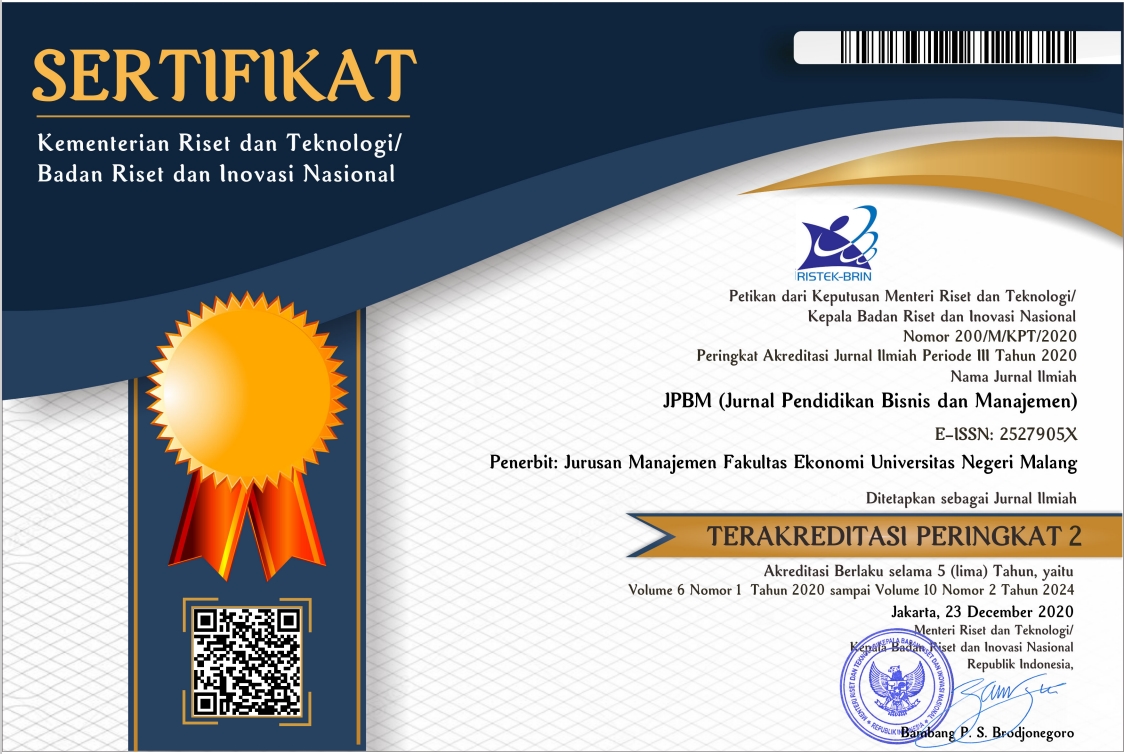The Impact of Parental Financial Teaching on University Students’ Financial Attitudes: The Mediating Role of Self-Control
Abstract
Most university students, who are in the process of transitioning from adolescence to adulthood, face difficulties managing their finances independently. To overcome these obstacles, students must have a positive financial attitude. This research aims to investigate both the direct and indirect impacts of parental financial teaching on students’ financial attitudes. In particular, the study examines the mediating effect of self-control on the relationship between financial education by parents and financial behaviors among accounting students. A survey was employed online to 219 accounting students in four different universities in October – December 2023. The data was then analyzed by applying SMART-PLS 4. The results of the analysis indicate that parental financial education tends to improve students’ behaviors in managing their finances. Furthermore, students who receive parental financial teaching are more likely to have positive self-control, which then positively affects their financial behaviors. This study enhances the existing finance literature and practice by demonstrating that improved parent-child communication can lead to the development of strong self-control in students when it comes to managing their finances.
Keywords: Parental financial teaching, Financial attitude, Self-control, University students
Full Text:
PDFReferences
Achtziger, A., Hubert, M., Kenning, P., Raab, G., & Reisch, L. (2015). Debt out of control: The links between self-control, compulsive buying, and real debts. Journal of Economic Psychology, 49, 141–149. https://doi.org/10.1016/j.joep.2015.04.003
Arnett, J. J. (2015). Emerging adulthood : The winding road from the late teens through the twenties. In the United States of America. Oxford University Press.
Bartholomae, S., & Fox, J. J. (2021). A decade review of research on college student financial behavior and well-being. Journal of Family and Economic Issues, 42(s1), 154–177. https://doi.org/10.1007/s10834-021-09756-6
Baumeister, R. F. (2002). Yielding to temptation: Self-control failure, impulsive purchasing, and consumer behavior. Journal of Consumer Research, 28(4), 670–676. https://doi.org/10.1086/338209
Damian, L. E., Negru-Subtirica, O., Domocus, I. M., & Friedlmeier, M. (2020). Healthy financial behaviors and financial satisfaction in emerging adulthood: A Parental socialization perspective. Emerging Adulthood, 8(6), 548–554. https://doi.org/10.1177/2167696819841952
Fan, L., & Chatterjee, S. (2019). Financial socialization, financial education, and student loan debt. Journal of Family and Economic Issues, 40(1), 74–85. https://doi.org/10.1007/s10834-018-9589-0
Farley, J. P., & Kim-Spoon, J. (2014). The development of adolescent self-regulation: reviewing the role of parent, peer, friend, and romantic relationships. Journal of Adolescence, 37(4), 433–440. https://doi.org/10.1016/j.adolescence.2014.03.009
Finkenauer, C., Engels, R. C. M. E., & Baumeister, R. F. (2005). Parenting behaviour and adolescent behavioural and emotional problems: The role of self-control. International Journal of Behavioral Development, 29(1), 58–69. https://doi.org/10.1080/01650250444000333
Fujita, K., Trope, Y., Liberman, N., & Levin-Sagi, M. (2006). Construal levels and self-control. Journal of Personality and Social Psychology, 90(3), 351–367. https://doi.org/10.1037/0022-3514.90.3.351
Gathergood, J. (2012). Self-control, financial literacy and consumer over-indebtedness. Journal of Economic Psychology, 33(3), 590–602. https://doi.org/10.1016/j.joep.2011.11.006
Gudmunson, C. G., & Danes, S. M. (2011). Family financial socialization: Theory and critical review. Journal of Family and Economic Issues, 32(4), 644–667. https://doi.org/10.1007/s10834-011-9275-y
Hair, Jr, J. F., Page, M., & Brunsveld, N. (2020). Essentials of Business research methods. In Essentials of Business Research Methods (4th ed.). Routledge. https://doi.org/10.4324/9781315704562
Haws, K. L., Davis, S. W., & Dholakia, U. M. (2016). Control over what? Individual differences in general versus eating and spending self-control. Journal of Public Policy and Marketing, 35(1), 37–57. https://doi.org/10.1509/jppm.14.149
IAESB. (2019). Handbook of international education pronouncements. In International Federation of Accountants. International Federation of Accountants.
Jayaraman, J. D., & Jambunathan, S. (2018). Financial literacy among high school students: Evidence from India. Citizenship, Social and Economics Education, 17(3), 168–187. https://doi.org/10.1177/2047173418809712
Jiang, S. S., & Dunn, L. F. (2013). New Evidence on credit card borrowing and repayment patterns. Economic Inquiry, 51(1), 394–407. https://doi.org/10.1111/j.1465-7295.2012.00456.x
Jorgensen, B. L., Rappleyea, D. L., Schweichler, J. T., Fang, X., & Moran, M. E. (2017). The financial behavior of emerging adults: A family financial socialization approach. Journal of Family and Economic Issues, 38(1), 57–69. https://doi.org/10.1007/s10834-015-9481-0
Kurniasari, I., Sumiati, & Ratnawati, K. (2023). The role of self-efficacy in mediating parental financial teaching on financial management behavior: A study on youths in Malang. International Journal of Research in Business and Social Science (2147- 4478), 12(4), 422–433. https://doi.org/10.20525/ijrbs.v12i4.2610
LeBaron-Black, A. B., Curran, M. A., Hill, E. J., Toomey, R. B., Speirs, K. E., & Freeh, M. E. (2023). Talk is cheap: Parent financial socialization and emerging adult financial well-being. Family Relations, 72(3), 1201–1219. https://doi.org/10.1111/fare.12751
Li, Y., Zuiker, V. S., Mendenhall, T. J., & Montalto, C. P. (2021). Parental financial socialization, financial experiences, and financial behaviors: Comparing Asian American and International Asian College Students. Journal of Financial Counseling and Planning, 32(1), 68–85. https://doi.org/10.1891/JFCP-19-00008
Mahapatra, M. S., Xiao, J. J., Mishra, R. K., & Meng, K. (2023). Parental financial socialization and life satisfaction of college students: Mediation and moderation analyses. Young Consumers, August. https://doi.org/10.1108/YC-10-2022-1626
Mazelis, J. M., & Kuperberg, A. (2022). Student loan debt, family support, and reciprocity in the transition to adulthood. Emerging Adulthood, 10(6), 1511–1528. https://doi.org/10.1177/21676968221080007
Meldrum, R. C. (2008). Beyond parenting: An examination of the etiology of self-control. Journal of Criminal Justice, 36(3), 244–251. https://doi.org/10.1016/j.jcrimjus.2008.04.005
Noh, M. (2022). Effect of parental financial teaching on college students’ financial attitude and behavior: The mediating role of self-esteem. Journal of Business Research, 143(February 2021), 298–304. https://doi.org/10.1016/j.jbusres.2022.01.054
OJK. (2021). Strategi nasional literasi keuangan Indonesia (SNLKI) 2021 - 2025. Indonesia. https://www.ojk.go.id/
Podsakoff, P. M., MacKenzie, S. B., & Podsakoff, N. P. (2012). Sources of method bias in social science research and recommendations on how to control It. Annual Review of Psychology, 63, 539–569. https://doi.org/10.1146/annurev-psych-120710-100452
Riany, Y. E., Meredith, P., & Cuskelly, M. (2017). Understanding the influence of traditional cultural values on Indonesian parenting. Marriage and Family Review, 53(3), 207–226. https://doi.org/10.1080/01494929.2016.1157561
Robb, C. A. (2011). Financial knowledge and credit card behavior of college students. Journal of Family and Economic Issues, 32(4), 690–698. https://doi.org/10.1007/s10834-011-9259-y
Shim, S., Barber, B. L., Card, N. A., Xiao, J. J., & Serido, J. (2010). Financial socialization of first-year college students: The roles of parents, work, and education. Journal of Youth and Adolescence, 39(12), 1457–1470. https://doi.org/10.1007/s10964-009-9432-x
Speklé, R. F., & Widener, S. K. (2018). Challenging issues in survey research: Discussion and suggestions. Journal of Management Accounting Research, 30(2), 3–21. https://doi.org/10.2308/jmar-51860
Strömbäck, C., Lind, T., Skagerlund, K., Västfjäll, D., & Tinghög, G. (2017). Does self-control predict financial behavior and financial well-being? Journal of Behavioral and Experimental Finance, 14, 30–38. https://doi.org/10.1016/j.jbef.2017.04.002
Te’eni-Harari, T. (2016). Financial literacy among children: The role of involvement in saving money. Young Consumers, 17(2), 197–208. https://doi.org/10.1108/YC-01-2016-00579
Vazsonyi, A. T., & Ksinan Jiskrova, G. (2018). On the development of self-control and deviance from preschool to middle adolescence. Journal of Criminal Justice, 56(May 2017), 60–69. https://doi.org/10.1016/j.jcrimjus.2017.08.005
Zhu, A. Y. F. (2018). Parental Socialization and financial capability among chinese adolescents in Hong Kong. Journal of Family and Economic Issues, 39(4), 566–576. https://doi.org/10.1007/s10834-018-9584-5
Zhu, A. Y. F. (2019). School financial education and parental financial socialization: Findings from A sample of Hong Kong adolescents. Children and Youth Services Review, 107(July). https://doi.org/10.1016/j.childyouth.2019.104532
DOI: http://dx.doi.org/10.17977/um003v10i12024p043
Refbacks
- There are currently no refbacks.
JPBM (Jurnal Pendidikan dan Bisnis Manajemen) is licensed under a Creative Commons Attribution-NonCommercial-ShareAlike 4.0 International License.
JPBM (Jurnal Pendidikan dan Bisnis Manajemen) is abstracted and indexed in :

















